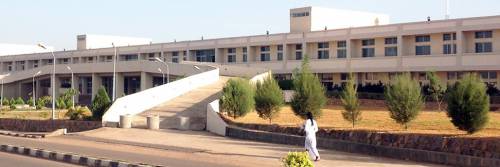
Prof. Edmund Banwat, Chief Medical Director (CMD), Jos University Teaching Hospital (JUTH), has flayed incessant strikes in the health sector, describing the situation as “very embarrassing”.
“The incessant strikes in a key sector like health is disheartening and has become a source of embarrassment to us,” Banwat told the News Agency of Nigeria (NAN) in Jos on Monday.
Banwat, who was reacting to the two-months-old strike of JUTH workers, said that government was taking stiff measures to check the trend.
“The health workers have formed a habit of abandoning their duty posts at the slightest excuse; this raises questions as to our professional vow to save lives.
“The incessant strikes make nonsense of such professional vows to place human lives over any other vain pursuit bordering on money,” he said.
To check the strikes, he said that the Federal Government has issued a circular reminding heads of medical facilities of the No-work-no-pay policy.
A copy of the circular, signed By Mr Danjuma Kurau, Director, Human Resources Management Department in the Federal Ministry of Health, directed all institutional heads to immediately implement the policy as contained in the Trade Disputes Act, Cap T8.
“The total disregard to this law has contributed in no small measure to the incessant labour disputes ravaging the health sector leading to the loss of several months of service.
“The health sector is one of the essential services prohibited by law from embarking on strikes, but government has been subjected to much ridicule and embarrassment owing to frequent strikes.”
The circular quoted the minister as directing that salaries and allowances should not be paid to any staff “who chooses the path of strike”.
On the strike by the JUTH workers since March 7, Banwat said that the action was “very unnecessary”.
“We met with the JUTH chapter of the Joint Health Sector Union (JOEHSU) before the strike and have met several times after it began where all the local issues were resolved, but I keep wondering why they are still at home,’’ said the CMD.
NAN recalls that JOHESU’s spokesman, Mr Mustafa Kabir, attributed the strike to issues bordering on promotion, lack of beds and basic consumables in the hospital, as well as the refusal to regulate the appointment of casual staff.
Kabir also alleged that Banwat had been very insensitive to the plight of the workers, among other issues.
But the CMD said that his administration had promoted staff stagnated for more than 14 years, pointing out that other issues of promotion were beyond JUTH and being handled by the national body of the union in Abuja.
He dismissed claims that the hospital had shortage of beds and other consumables, and challenged anyone with doubt to visit the hospital stores.
He also rejected insinuation that the mortuary was in bad shape, explaining that the one at the temporary site had been handed over to the Plateau Government, while the mortuary at the permanent site was in excellent condition.
The CMD also accused JOHESU officials of subjecting members to “unncessary pain”, noting that the JOHESU headquarters had confirmed that issues within the capacity of JUTH had been effectively sorted out.
On the casual staff, he said that he inherited 200 casual staff and was working with the Federal Character Commission toward regularising their employment.
(NAN)